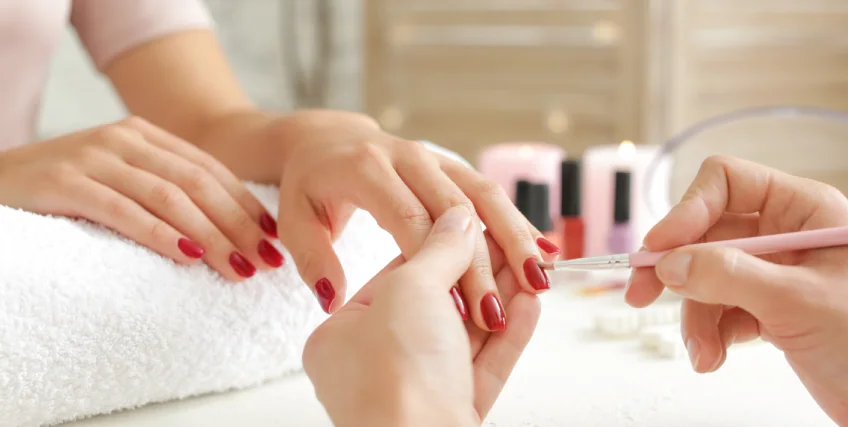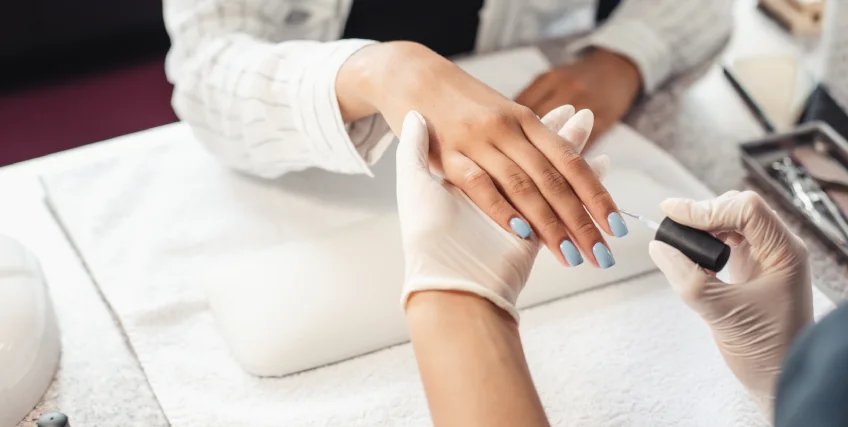Nail Salon Loans: How to Finance and Grow Your Beauty Business
Jul 29, 2025 | Last Updated on: Jul 30, 2025

Operating a nail salon in the U.S. requires much more than just creativity. Between rent, supplies, and staff wages, the expenses stack up quickly. Many salon owners often face a lot of hurdles when trying to secure enough working capital to meet daily and long-term business needs.
Across the beauty industry, nail salon loans are becoming important to manage unpredictable cash flow and invest in modern salon equipment or expansion. For beauty salon owners looking to stay ahead in this competitive industry, understanding the available funding options is a critical step.
In this article, we’ll explore how nail salon loans can support your business. We’ll also discuss the different salon financing options available, how to qualify, and ways to use funds wisely. No matter if you need to hire more staff, revamp your space, or keep up with customer trends, this guide breaks it down clearly.
Why Nail Salons Might Need Extra Funding
Busy nail salons typically experience seasonal highs and lows, especially around holidays and slower months. During those times, cash flow can become tight even if the salon is usually profitable. As a result, nail salon financing ensures smooth operations and allows business owners to plan for both expected and unexpected expenses.
Additionally, maintaining consistent service quality and investing in the salon’s appearance require steady funding. Therefore, salon owners can utilize nail salon loans that help prevent disruptions and keep the business positioned for long-term success.
Here’s why nail salons might need extra business loans:
- Renovating the space: Nail salon loans can be used to renovate the space by adding modern interiors. This improves customer comfort and brings in more clients.
- Buying new salon equipment: Nail salon owners can invest in tools like LED lamps or massage pedicure chairs through business loans for nail salons.
- Hiring skilled stylists: Better staff means better service. Hence, nail salon loans can help cover new payroll costs.
- Covering operating expenses: To cover working capital like rent, utility bills, and supplies, nail salon small business loans can keep things running.
- Expanding your beauty business: Growth of a small business often requires more cash upfront. Therefore, real estate deposits, signage, and furniture can be financed with a small business loan.
- Launching a startup: New beauty salon owners can benefit from nail salon loans to cover early-stage setup costs and reach their business goals.
Understanding Nail Salon Loans
Nail salon loans are financial tools that are designed to help salon owners grow and sustain their salon businesses. These business financing options can be used to cover a variety of business needs. From handling payroll to purchasing new equipment, the funds offer flexibility and support to small business owners.
Here are the different types of financing options that can be used for the nail salon industry.
SBA Loans
SBA loans are backed by the U.S. Small Business Administration and are offered by traditional banks and credit unions. These bank loans often come with lower interest rates and longer repayment terms. SBA 7(a) loan program, in particular, can be used to cover a wide range of business expenses like purchasing salon equipment and refinancing existing debt. However, the loan application process can be time-consuming, and lenders may have strict eligibility criteria.
Term Loans
Term loans offer a lump sum loan amount upfront that can be repaid over a set period of time. These loans often come with competitive rates and a fixed repayment structure. Nail salon owners can use these beauty salon loans for expansions, salon upgrades, or big one-time purchases like real estate or furniture. Therefore, term loans allow for better budget planning due to a fixed repayment schedule.
Business Line of Credit
A business line of credit offers flexible access to the necessary funds up to a set credit limit. This loan option works where small business owners can withdraw funds when needed. Here, the interest is charged only on the amount used. A line of credit is one of the best options for nail salon loans to cover short-term operating expenses or purchasing supplies in bulk.
Equipment Financing
Equipment financing is an ideal funding solution for nail salon owners to purchase or lease new salon equipment. This includes items like manicure chairs, pedicure stations, or ventilation systems. Instead of paying a large upfront amount for the equipment, small business owners can pay in easy monthly installments. Hence, equipment loans are easier to qualify as the equipment itself acts as collateral for the lenders.
Personal Loans for Business Use
Nail salon startups with limited credit history can use personal loans for business funding through alternative lenders. However, loan approval often depends on the borrower’s personal credit score and income. Therefore, personal loans can be used as nail salon loans to cover early-stage expenses such as licenses, salon decor, or website development.
Business owners can use all of the above nail salon loans to fund their businesses. However, choosing the right loan type depends on various factors like business goals, loan amount needed, credit history, and available repayment terms. Moreover, lenders will evaluate the full picture, so being prepared with a solid business plan and financial statements can make the process smoother.
What Lenders Usually Look For
When applying for nail salon loans, lenders usually evaluate several factors. Knowing what these factors are can improve your loan application process. Let’s see what lenders are looking for.
- Credit Score: Lenders typically look at both, personal and business credit scores. A credit score of 670 and above improves your chances of approval.
- Credit History: A clean repayment history boosts confidence in your ability to manage a nail salon loan.
- Business History: When applying for a nail salon loan, lenders may require at least 12-24 months in business.
- Cash Flow & Revenue: Consistent income proves you can repay the loan. Hence, submit up-to-date bank statements and financial statements when applying for nail salon loans.
- Debt Load: Too much existing debt may lower your eligibility. Therefore, it’s better to repay current loans first.
- Purpose of Loan: Always be clear about your business plan, how you'll use the funds, and the expected outcome.
Improve Your Chances of Approval
Before applying for nail salon loans, take a few steps to improve your profile. These actions show that you're a responsible borrower.
- Register Your Business: Make sure your beauty salon is legally formed and compliant with local regulations.
- Separate Finances: Open a business bank account. Avoid using personal credit cards for business expenses.
- Build Business Credit: Pay bills on time. Work with vendors that report to business credit bureaus.
- Write a Business Plan: Include your services, pricing, competition, growth plans, and how the loan will support your goals.
- Pay Down Debt: Lowering your balances strengthens your credit score and loan eligibility.
- Keep Documents Ready: Lenders often ask for tax returns, bank statements, and financial records during the loan application process.
Smart Ways to Use Nail Salon Financing
Getting funding is just one step. Using it wisely ensures you see a return on investment. Here are some ways to use nail salon loans effectively:
- Upgrade Salon Equipment: New chairs, sterilizers, and dryers can improve client satisfaction. Use equipment loans or business financing to cover costs.
- Invest in Staff Training: Boost your team's skills. Trained stylists attract loyal customers and help your beauty salon stand out.
- Expand Services: Add new offerings like gel nails, spa pedicures, or facials. More services often lead to higher ticket values.
- Market Your Business: Use social media ads or local promotions. Good marketing improves visibility and drives bookings.
- Set Up Emergency Reserves: A portion of the loan amount can be saved for unexpected expenses like repairs or inventory restocks.
The Bottom Line
Nail salon loans open doors for growth. From new locations to upgraded tools, the right business funding helps your vision take shape.
If you're a beauty salon owner ready to take the next step, now is a great time to explore salon financing options. With so many loan options available, from SBA 7a to short-term loans and credit lines, you don’t have to compromise your business goals.
FAQs About Nail Salon Loans
How can a nail salon qualify for a business loan?
Qualifying often depends on several factors, including your credit score, time in business, and monthly revenue. Lenders may also evaluate your financial statements, tax returns, and business plan to assess repayment ability. Some lenders are more flexible with startups, while others focus on established salons.
Can I get a nail salon loan with bad credit?
Securing financing with a low credit score might feel challenging, but it isn’t always out of reach. Some salon owners explore options through alternative lenders who may consider more than just credit history. These lenders sometimes focus on current cash flow or daily sales. The loan terms, however, could differ from those offered to borrowers with stronger credit.
Are credit cards a good option for salon funding?
Credit cards may offer a short-term solution, especially for smaller purchases. However, they typically come with high interest rates if not paid in full each month. For larger investments, such as salon remodeling or equipment purchases, structured financing options like term loans or lines of credit are often more manageable.
Is it necessary to have a business plan when applying for a salon loan?
It’s not always required, but it can certainly help. A detailed business plan shows lenders that you’ve thought through your strategy and know how the funds will be used. It can make a strong impression, especially if you're applying for a loan with a traditional bank or the SBA. Even for online lenders, having one can improve your credibility and decision-making process.
What documents do lenders typically ask for?
Lenders generally request a mix of personal and business documents. This might include bank statements, tax returns, a copy of your business license, profit and loss statements, and a written business plan. Startups may need to provide personal financial records as well. The more organized you are, the smoother the loan application process tends to be.
Frequent searches leading to this page
Term Loans are made by Itria Ventures LLC or Cross River Bank, Member FDIC. This is not a deposit product. California residents: Itria Ventures LLC is licensed by the Department of Financial Protection and Innovation. Loans are made or arranged pursuant to California Financing Law License # 60DBO-35839




